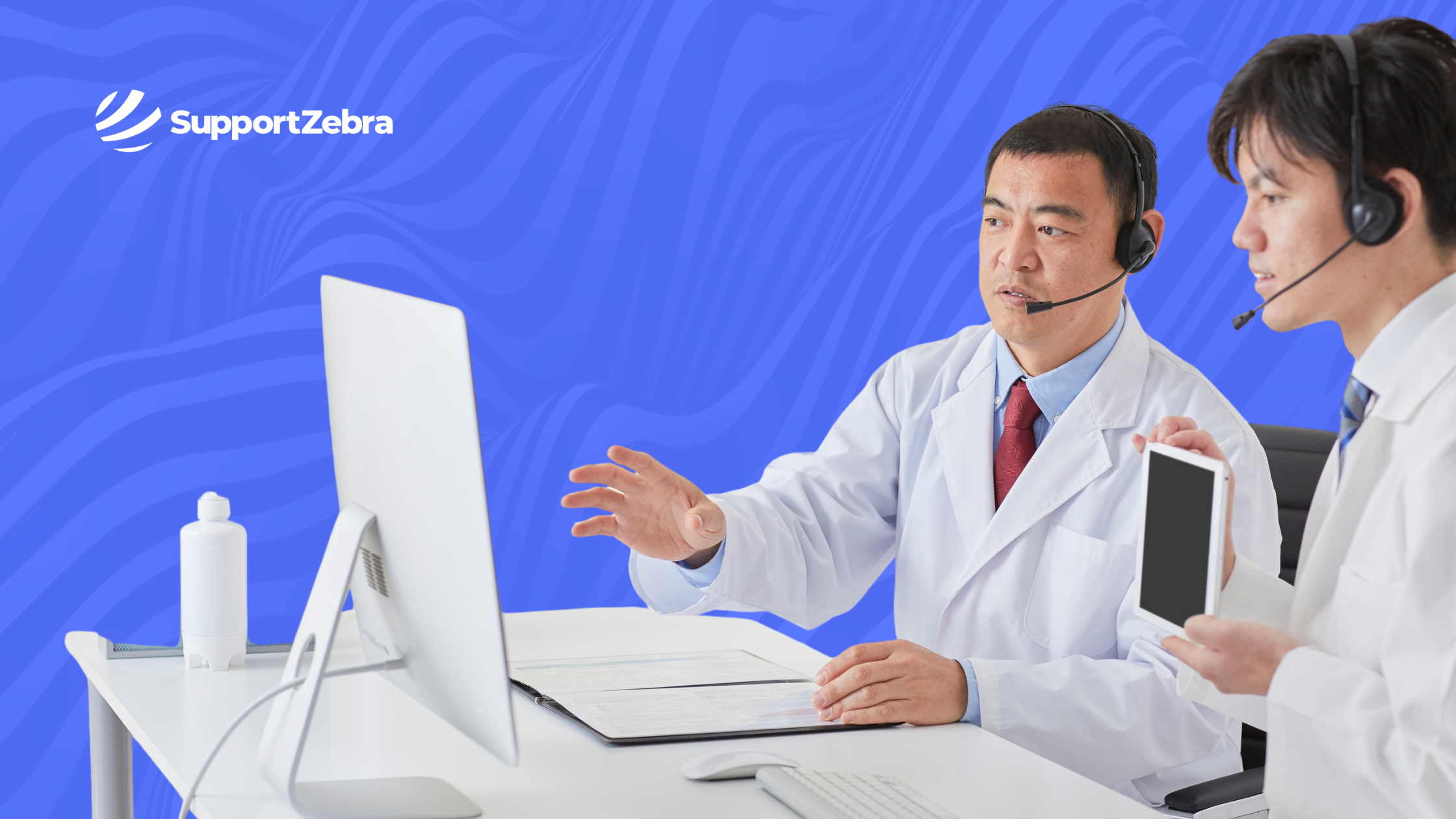Key Takeaways:
- Evaluating virtual healthcare assistants is essential to maintain patient trust and efficiency.
- Focus on metrics such as response time, accuracy, and patient satisfaction.
- Regular monitoring, patient feedback, and the right tools can optimize performance.
- SupportZebra provides expert support to enhance virtual assistant effectiveness and improve patient care.
Is your virtual healthcare assistant failing you? You implemented it to ease the burden, but now you’re facing vague results, frustrated patients, and costly inefficiencies. This isn’t just a minor tech issue. Left unchecked, these digital tools can damage patient trust and bleed your budget dry, turning a promising solution into a very real problem.
This blog provides the clear, actionable framework you need. We will show you exactly how to measure what truly matters, so you can transform your virtual assistant from a cost center into your most powerful tool for patient support.
What Is a Virtual Healthcare Assistant and What Does It Do?
A virtual healthcare assistant is a digital tool that interacts with patients through chat, voice, or app interfaces. It can answer questions, schedule appointments, provide reminders, and assist with routine tasks. By handling repetitive tasks, these assistants reduce staff workload, improve patient engagement, and streamline operations. However, their value depends on consistent, accurate performance and integration with your healthcare system.
Why Is It Important to Evaluate Virtual Healthcare Assistant Performance?
Without regular evaluation, virtual healthcare assistants can create inefficiencies and frustrate patients. Poorly performing assistants may provide inaccurate information, slow responses, or fail to follow up properly. Evaluating performance ensures:
- Patients receive timely and accurate support.
- Staff workload remains manageable.
- Compliance with healthcare standards is maintained.
- Budget and resources are optimized.
In short, evaluation transforms a virtual assistant from a potential liability into a valuable support tool.
What Key Metrics Should I Track When Assessing a Virtual Healthcare Assistant?
Measuring the right metrics is crucial for meaningful evaluation. Focus on metrics that reflect both efficiency and patient satisfaction:
- Response time – how quickly the assistant replies.
- Accuracy rate – correctness of medical or administrative responses.
- Task completion rate – appointments booked, reminders sent, forms processed.
- Patient satisfaction – ratings or feedback after interactions.
- Escalation rate – how often issues need human intervention.
Tracking these metrics helps identify strengths, weaknesses, and areas for improvement.

How Do Response Time and Accuracy Affect Patient Support Quality?
Response time and accuracy directly impact the patient experience. Slow responses can frustrate patients and delay care. Inaccurate answers can lead to confusion or even safety risks. Consistently fast and correct responses improve trust, satisfaction, and adherence to treatment plans. Monitoring these aspects allows healthcare providers to prioritize improvements and maintain high-quality patient support.
What Tools Can Help Measure the Performance of a Virtual Healthcare Assistant?
Several tools make evaluation simpler and more accurate. These include:
- Analytics dashboards – track response times, task completion, and error rates.
- Survey platforms – collect patient feedback after each interaction.
- AI monitoring software – flags repeated mistakes or unusual patterns.
- Reporting tools — summarize performance trends over time.
Using the right combination of tools ensures comprehensive performance monitoring and actionable insights.
How Often Should Virtual Healthcare Assistants Be Evaluated?
Regular evaluation is key to maintaining efficiency. Consider these timelines:
- Weekly checks – for urgent metrics like response time and error rates.
- Monthly reviews – for overall trends, escalation rates, and patient feedback.
- Quarterly assessments – to adjust workflows, update knowledge bases, and implement improvements.
Frequent reviews prevent minor issues from becoming systemic problems.
What Are Signs That a Virtual Healthcare Assistant Is Underperforming?
Recognizing underperformance early allows corrective action. Warning signs include:
- Frequent inaccurate responses or misinformation.
- Slow or inconsistent response times.
- High escalation to human staff.
- Negative patient feedback or low satisfaction scores.
- Failure to complete tasks or meet workflow standards.
Spotting these signs helps healthcare providers intervene before patient experience is affected.
How Can Healthcare Providers Improve a Virtual Assistant’s Performance?
Improving performance requires a mix of monitoring, training, and optimization:
- Update knowledge bases regularly.
- Train assistants with new protocols or guidelines.
- Review analytics to identify common errors.
- Adjust workflows to reduce bottlenecks.
- Collect patient feedback to guide improvements.
These steps ensure the virtual assistant continuously delivers reliable support.
How Do Patient Feedback and Satisfaction Scores Factor Into Performance Reviews?
Patient feedback is one of the most valuable performance indicators. Satisfaction scores reveal how interactions are perceived and identify gaps in service. Combining feedback with other metrics like accuracy and response time provides a holistic view of performance. Acting on feedback demonstrates commitment to patient care and can improve overall trust and engagement.
What Are the Long-Term Benefits of Monitoring Virtual Healthcare Assistant Performance?
Regular performance monitoring offers long-term advantages:
- Consistent, high-quality patient support.
- Reduced staff burnout and workload.
- Better resource allocation and cost control.
- Improved compliance with healthcare standards.
- Greater patient trust and loyalty.
Monitoring ensures that virtual healthcare assistants remain a strategic asset rather than a costly liability.
How Can SupportZebra Help Improve the Performance of My Virtual Healthcare Assistants?
SupportZebra offers expert healthcare support teams who monitor and optimize virtual assistant performance. They provide:
- Continuous quality checks.
- Data-driven recommendations to improve accuracy and efficiency.
- Patient engagement monitoring.
- Integration with your healthcare systems for seamless operations.
Partnering with SupportZebra ensures your virtual healthcare assistants deliver reliable, timely, and compliant patient support.
Get Expert Support for Your Virtual Healthcare Operations
Optimizing virtual healthcare assistants takes more than technology—it requires expertise, ongoing monitoring, and actionable insights. SupportZebra provides the healthcare support experience and tools you need to improve performance, reduce inefficiencies, and deliver exceptional patient care. Connect with our experts today to elevate your virtual healthcare operations.

